2012年春季(2012
2012年春季地域文化第二次作业(第3章---第6章)湖湘文化答案
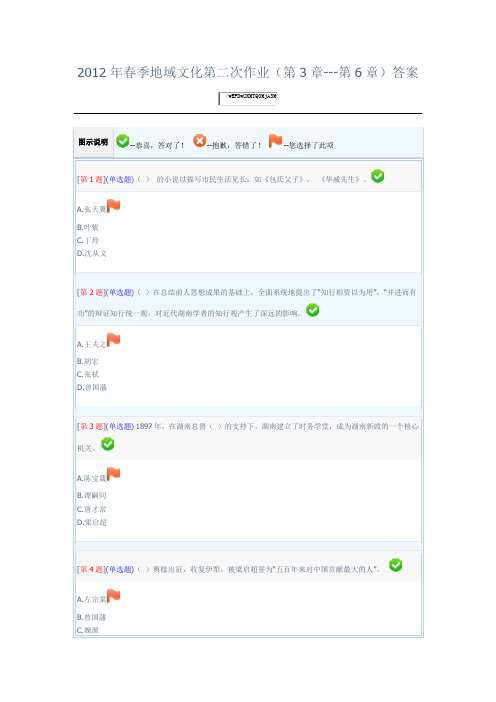
2012年春季地域文化第二次作业(第3章---第6章)答案--恭喜,答对了!--抱歉,答错了!--您选择了此项[第1题](单选题)()的小说以描写市民生活见长,如《包氏父子》,《华威先生》。
A.张天翼B.叶紫C.丁玲D.沈从文[第2题](单选题)()在总结前人思想成果的基础上,全面系统地提出了“知行相资以为用”,“并进而有功”的辩证知行统一观,对近代湖南学者的知行观产生了深远的影响。
A.王夫之B.胡宏C.张栻D.曾国藩[第3题](单选题) 1897年,在湖南总督()的支持下,湖南建立了时务学堂,成为湖南新政的一个核心机关。
A.陈宝箴B.谭嗣同C.唐才常D.梁启超[第4题](单选题)()舆榇出征,收复伊犁,被梁启超誉为“五百年来对中国贡献最大的人”。
A.左宗棠B.曾国藩C.魏源D.陶澍[第5题](单选题)严格意义上的、体系性的湖湘学术思想是从( )才开始形成的。
A.宋代B.唐代C.明代D.元代[第6题](单选题)1902年,清政府管学大臣、长沙人()拟定了《钦定学堂章程》。
它是中国历史上第一个全国统一的近代学制,史称“壬寅学制”。
A.张百熙B.魏源C.谭嗣同D.陈天华[第7题](单选题)下列作品不是沈从文创作的是( )A.《莎菲女士的日记》B.《边城》C.《长河》D.《萧萧》[第8题](单选题)()的小说以描写市民生活见长,如《包氏父子》,《华威先生》。
A.张天翼B.叶紫C.丁玲D.沈从文[第9题](单选题) 在马王堆出土的()介绍了283个古医方和医疗方法,计有103个疾病名称、247种药物名称,内容涉及内科、外科、妇产科、儿科、五官科等。
A.《五十二病方》B.《伤寒杂病论》C.《天文气象杂占》D.《黄帝内经》[第10题](单选题)近代湖湘散文,与近代湖湘诗歌的思潮流派大体一致。
其中有以()为代表的桐城派——湘乡派散文。
A.曾国藩B.魏源C.C谭嗣同D.陈天华[第11题](多选题)关于周敦颐的描述与评价,正确的有:A.从《宋史》开始就肯定周敦颐是宋明理学的开创者,到后来被推到“道学宗主”的地位。
2012年春季管理学原理(本)网上作业
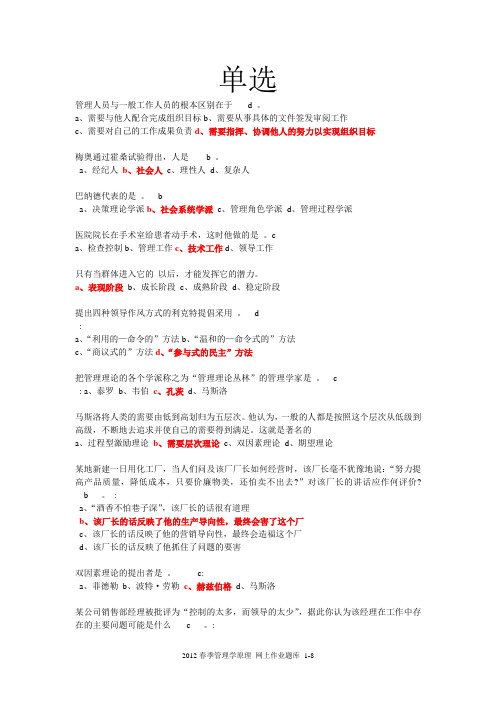
单选管理人员与一般工作人员的根本区别在于__ _d_。
a、需要与他人配合完成组织目标b、需要从事具体的文件签发审阅工作c、需要对自己的工作成果负责d、需要指挥、协调他人的努力以实现组织目标-梅奥通过霍桑试验得出,人是____b_。
a、经纪人b、社会人c、理性人d、复杂人-巴纳德代表的是。
ba、决策理论学派b、社会系统学派c、管理角色学派d、管理过程学派-医院院长在手术室给患者动手术,这时他做的是。
ca、检查控制b、管理工作c、技术工作d、领导工作-只有当群体进入它的以后,才能发挥它的潜力。
a、表现阶段b、成长阶段c、成熟阶段d、稳定阶段-提出四种领导作风方式的利克特提倡采用。
d:a、“利用的—命令的”方法b、“温和的—命令式的”方法c、“商议式的”方法d、“参与式的民主”方法-把管理理论的各个学派称之为“管理理论丛林”的管理学家是。
c: a、泰罗b、韦伯c、孔茨d、马斯洛马斯洛将人类的需要由低到高划归为五层次。
他认为,一般的人都是按照这个层次从低级到高级,不断地去追求并使自己的需要得到满足。
这就是著名的a、过程型激励理论b、需要层次理论c、双因素理论d、期望理论-某地新建一日用化工厂,当人们问及该厂厂长如何经营时,该厂长毫不犹豫地说:“努力提高产品质量,降低成本,只要价廉物美,还怕卖不出去?”对该厂长的讲话应作何评价? __b__ 。
:a、“酒香不怕巷子深”,该厂长的话很有道理b、该厂长的话反映了他的生产导向性,最终会害了这个厂c、该厂长的话反映了他的营销导向性,最终会造福这个厂d、该厂长的话反映了他抓住了问题的要害-双因素理论的提出者是。
c:a、菲德勒b、波特·劳勒c、赫兹伯格d、马斯洛某公司销售部经理被批评为“控制的太多,而领导的太少”,据此你认为该经理在工作中存在的主要问题可能是什么___ c___。
:a、对下述销售人员的疾苦没有给予足够的关心b、对销售任务的完成没有给予充分的关注c、事无巨细,过分亲历亲为,没有做好授权工作d、没有为下属销售人员制定明确的奋斗目标-在经营单位组合分析法中,具有较低业务增长率和较低市场占有率的经营单位是__d __。
上海市2012年春季高考英语试卷含答案
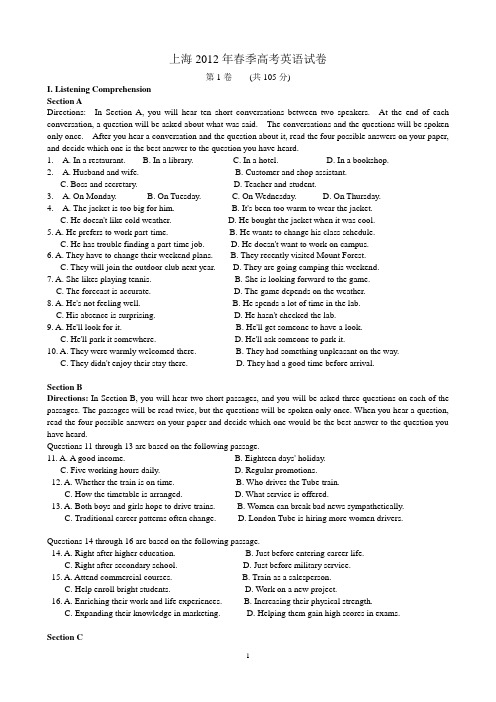
上海2012年春季高考英语试卷第1卷(共105分)I. Listening ComprehensionSection ADirections: In Section A, you will hear ten short conversations between two speakers. At the end of each conversation, a question will be asked about what was said. The conversations and the questions will be spoken only once. After you hear a conversation and the question about it, read the four possible answers on your paper, and decide which one is the best answer to the question you have heard.1. A. In a restaurant. B. In a library. C. In a hotel. D. In a bookshop.2. A. Husband and wife. B. Customer and shop assistant.C. Boss and secretary.D. Teacher and student.3. A. On Monday. B. On Tuesday. C. On Wednesday. D. On Thursday.4. A. The jacket is too big for him. B. It's been too warm to wear the jacket.C. He doesn't like cold weather.D. He bought the jacket when it was cool.5. A. He prefers to work part-time. B. He wants to change his class schedule.C. He has trouble finding a part-time job.D. He doesn't want to work on campus.6. A. They have to change their weekend plans. B. They recently visited Mount Forest.C. They will join the outdoor club next year.D. They are going camping this weekend.7. A. She likes playing tennis. B. She is looking forward to the game.C. The forecast is accurate.D. The game depends on the weather.8. A. He's not feeling well. B. He spends a lot of time in the lab.C. His absence is surprising.D. He hasn't checked the lab.9. A. He'll look for it. B. He'll get someone to have a look.C. He'll park it somewhere.D. He'll ask someone to park it.10. A. They were warmly welcomed there. B. They had something unpleasant on the way.C. They didn't enjoy their stay there.D. They had a good time before arrival.Section BDirections: In Section B, you will hear two short passages, and you will be asked three questions on each of the passages. The passages will be read twice, but the questions will be spoken only once. When you hear a question, read the four possible answers on your paper and decide which one would be the best answer to the question you have heard.Questions 11 through 13 are based on the following passage.11. A. A good income. B. Eighteen days' holiday.C. Five working hours daily.D. Regular promotions.12. A. Whether the train is on time. B. Who drives the Tube train.C. How the timetable is arranged.D. What service is offered.13. A. Both boys and girls hope to drive trains. B. Women can break bad news sympathetically.C. Traditional career patterns often change.D. London Tube is hiring more women drivers.Questions 14 through 16 are based on the following passage.14. A. Right after higher education. B. Just before entering career life.C. Right after secondary school.D. Just before military service.15. A. Attend commercial courses. B. Train as a salesperson.C. Help enroll bright students.D. Work on a new project.16. A. Enriching their work and life experiences. B. Increasing their physical strength.C. Expanding their knowledge in marketing.D. Helping them gain high scores in exams.Directions:In Section C, you will hear two longer conversations. The conversations will be read twice. After you hear each conversation, you are required to fill in the numbered blanks with the information you have heard. Write your answers on your answer sheet.Blanks 17 through 20 are based on the following conversation.Complete the form. Write ONE WORD for each answer.School Life SurveyName: 17 SmithClass: 18Favourite subjects: Computer 19 and P.E.Three favourite places: Computer room, school garden and 20Blanks 21 through 24 are based on the following conversation,Complete the form. Write NO MORE THAN THREE WORDS for each answer.What was Bob's request? To increase 21What were raises in the company based on? They were based on 22When could Bob earn a raise according to the boss? When he made the office run 23What did the boss finally say to Bob? Bob would have to 24 for himself.II. Grammar and VocabularySection ADirections:Beneath each of the following sentences there are four choices marked A, B, C and D. Choose the one answer that best completes the sentence.25. A huge amount of money has been spent _ _ the new bridge.A. inB. onC. withD. for26. They don't come to the book club any more, for _ reasons or other.A. someB. allC. eitherD. both27. You _____ bring your identification when you open a bank account.A. mayB. canC. mustD. will28. After the accident, we are _____ concerned with the safety of school buses than we used to be.A. littleB. lessC. muchD. more29. Before I began this job, I _____ a baby sitter for two years.A. have beenB. wasC. would beD. had been30. The diamond mine _______ accidentally by a little boy when he was playing hide-and-seek.A. discoveredB. was discoveredC. has been discoveredD. would discover31. Tom looked upon the test as an obstacle _____ his classmates regarded it as a challenge.A. whileB. becauseC. unlessD. if32. People have learnt the importance of keeping a balanced diet _____ their nutritional needs.A. satisfyB. satisfiedC. to satisfyD. having satisfied33. Once _ _, Joe devoted her life to looking after children and being a full-time homemaker.A. having marriedB. being marriedC. marryingD. married34. _____ you take a photo, you should always check the position of the sun.A. BeforeB. AfterC. BecauseD. Though35. Despite the fact _____ they lacked food, the explorers continued towards the goal.A. whichB. thatC. whatD. whether36. Sailing across the ocean alone was an achievement took courage.A. whatB. whoC. whichD. where37. a wet football can hurt your foot if you are not careful.38. It was not until 1920 American women had the chance to vote in national elections.A. whenB. thatC. whereD. which39. Portable videophones will show us _____ is happening at the other end of the line.A. whichB. whatC. howD. why40. Big companies usually have a lot of branch offices _____ in different parts of the world.A. to have operatedB. be operatedC. operatingD. having operatedSection BDirections: Complete the following passage by using the words in the box. Each word can only be used once. Note that there is one word more than you need.A. accountedB. averageC. continuousD. rankE. linkF. comparison G additional H. associated I. risk J. confirmedTelevision watching is an activity which is known to be harmful to health and is distinct from getting too little exercise. But a new study suggests its damaging effects may even 41 alongside those from smoking and obesity. Researchers who studied television viewing habits in Australia calculated that people who watch for a(n) 42 of six hours a day shorten their life expectancy by almost five years.They based their calculations on data on the 43 between television viewing and death from the Australian obesity and lifestyle study which involved l 1,000 adults aged 25 and over. Applying these findings to the whole population over 25, who are estimated to have watched 9.8 billion hours of TV in 2008, they concluded that it 44 for 286,000 years of life lost --- equivalent to 22 minutes for each hour watched. By 45 , smoking one cigarette is estimated to shorten life expectancy by 11 minutes --- equivalent to half an hour of TV watching.Writing in the British Journal of Sports Medicine, the authors from the University of Queensland, say the figures suggest "huge loss of life may be 46 with too much TV viewing." The UK and other industrialized countries are likely to be similarly affected "given the typically large amounts of time spent watching TV and the similarities in disease patterns." The researchers add: "If these figures are 47 and shown to reflect a cause and effect relationship, TV viewing is a public health problem comparable in size to established behavioral risk factors."Researchers from Taiwan University found even those who did as little as 92 minutes' exercise a week--- equivalent to 15 minutes a day for six days a week --- reduced their 48 of death by 14 per cent. Even this small amount of exercise could postpone one in six of all deaths --- similar to the effects of a stop-smoking programme. Each 49 15 minutes a day reduced the death rate by a further 4 per cent.III. Reading ComprehensionSection ADirections: For each blank in the following passage there are four words or phrases marked A, B, C and D. Fill in each blank with the word or phrase that best fits the context.A screen door allows for an open view while at the same time affording a degree of privacy. 50 , communication between parents and their child away at college should have openness in expressing viewpoints but, at the same time, it should demonstrate a respect for privacy. Staying in touch with each other is important because without 51 , there is no connection and worry can take over. All involved should try to be 52 in listening to, understanding and dealing with special concerns or needs that arise whether they be from the student, parents or friends.For the happy student adjusting well at school, calls to home can be infrequent. This is not necessarily a cause for parents to 53 . While parents are naturally 54 about what their child is up to, the majority of students are busy getting accustomed to their new home, making new friends and 55 to new schedules and activities. The fact is that without any ill intention on purpose, they can spend little time thinking about home and they may not appreciate the degree of their parents' 56 curiosity.circumstance can bring a 58 period for both parent and child. For the parents at home, it can be terribly 59 to sense their child is unhappy. It is difficult to judge how we should react to this challenge: as 60 , we want to bring our children home to the safety of our nest; in our parent-teacher role, we want to 61 the ties and allow our child the opportunity to make it on his/her own.For the student away at school, unhappiness can be lonely and frightening and in some cases, it can lead to depression and illness. There is a sense of 62 for some homesick students who fear that Mom and Dad will 63 their inability to cope with the new environment. This is especially true when the homesick one sees classmates adjusting somewhat effortlessly. No matter what the circumstances are that have created 64 , communication between parent and child must remain open, honest and in balance.50. A. Relatively B. Contrarily C. Typically D. Similarly51. A. sacrifice B. privacy C. appreciation D. communication52. A. sensitive B. confident C. casual D. modest53. A. worry B. regret C. cheer D. wonder54. A. uninformed B. curious C. happy D. sensible55. A. adding B. referring C. adjusting D. leading56. A. strange B. increasing C. awakened D. normal57. A. formally B. frequently C. sincerely D. patiently58. A. disappointing B. recovering C. challenging D. training59. A. damaging B. disturbing C. demanding D. exhausting60. A. protectors B. reminders C. inspectors D. individuals61. A. maintain B. establish C. restore D. cut62. A. relief B. responsibility C. achievement D. embarrassment63. A. get bored with B. get upset with C. be ignorant of D. be honest with64. A. opportunity B. uncertainty C. unhappiness D. nervousnessSection BDirections: Read the following three passages. Each passage is followed by several questions or unfinished statements. For each of them there are four choices marked A, B, C and D. Choose the one that fits best according to the information given in the passage you have just read.(A)For six hours we shot through the landscape of the Karoo desert in South Africa. Just rocks and sand and baking sun. Knowing our journey was ending, Daniel and I just wanted to remember all we had seen and done. He used a camera. I used words. I had already finished three notebooks and was into the fourth, a beautiful leather notebook I'd bought in a market in Mozambique.Southern Africa was full of stories and visions. We were almost drunk on sensations. The roaring of the water at Victoria Falls, the impossible silence of the Okavango Delta in Botswana. And then the other things: dogs in the streets, whole families in Soweto living in one room, a kilometre from clean water.As we drove towards the setting sun, a quietness fell over us. The road was empty -- we hadn't seen another car for hours. And as I drove, something caught my eye, something moving next to me. I glanced in the mirror of the car; I glanced sideways to the right, and that was when I saw them. Next to us, by the side of the road, thirty, forty wild horses were racing the car, a cloud of dust rising behind them -- brown, muscular horses almost close enough to touch them, to smell their hot breath. I didn't know how long they had been there next to us.I shouted to Dan: "Look!", but he was in a deep sleep, his camera lying useless by his feet. They raced the car for a few seconds, then disappeared far behind us, a memory of heroic forms in the red landscape. When Daniel woke up an hour later I told him what had happened."Wild horses?" he said. "Why didn't you wake me up?""I tried. But they were gone after a few seconds.""Are you sure you didn't dream it?""You were the one who was sleeping!"We checked into a dusty hotel and slept the sleep of the dead.65. During their journey in Africa, the two travelers .A. made friends with local residentsB. complained about the poor living conditionsC. enjoyed the sunset in the Karoo desert mostD. recorded their experiences in different ways66. What does the phrase "heroic forms" in Paragraph 4 refer to?A. Racing cars.B. Wild horses.C. Eye-catching locals.D. Running dogs.67. What did Daniel think when he woke up and was told what had happened?A. He always missed out on the best thing.B. He had already taken beautiful pictures.C. A sound sleep was more important.D. The next trip would be better.68. What is the passage mainly about?A. How to view wildlife in Africa.B. Running into wildlife in Africa.C. Tourist attractions in southern Africa.D. Possible dangers of travelling in the desert.(B)The Age of UnreasonCharles Handy In his book The Age of Unreason Professor Handy describes the dramatic changes that are taking place in our lives today and warns that we must adapt to these changes if we want to survive in the future. Handy believes that in the future less than 50% of the workforce will be employed full-time by an organization. These full-time employees will be the qualified professionals, technicians, and managers who are essential to an organization. Their working lives will be a lot more demanding than today, but in return they will be well-paid and they will retire earlier. The rest of the workforce will be self-employed or will work part-time, providing organizations with the products and services they require on a contract basis. Handy forecasts a big increase in the number of working mothers in future and believes there will be a large number of unemployed.Handy gives us plenty of figures to worry about. He estimates that by the year 2040, one person in five will retire, and one in ten will be over seventy-five years old. There will be one retiree to every three people of working age, and even more than that in countries such as Germany and Switzerland, where the proportion will be as much as one to two. Retirees will remain healthy and active for longer than they do today and many will live to be a hundred years old, a fact which leads Handy to suggest that the term retirement will no longer be appropriate. He suggests the third age is a more appropriate description, since it will be as important a part of our lives as the first age of learning and the second age of working are for us today.69. Professor Handy wrote the book most probably to .A. warn us of potential social problems in the futureB. predict the leading professions in the coming yearsC. describe the effect of unemployment on societyD. suggest a better term for future retirement70. According to Professor Handy, the future workforce will .A. adapt to the changes in retirement easilyB. be mainly self-employedC. have fewer full-time workers than todayD. work on a contract basis71. From the last paragraph, we learn that about 30 years from now, .A. the number of retirees will double in many countriesB. ageing will be a common and serious problemC. 10% of the population will live to be 100 years oldD. the third age will be the most important part of our lives(C)Frederic Mishkin, who's been a professor at Columbia Business School for almost 30 years, is good at solving problems and expressing ideas. Whether he's standing in front of a lecture hall or engaged in a casual conversation, his hands are always waving and pointing. When he was in graduate school, one of his professorsthe professor's office.It turns out, however, that Mishkin's professor had it exactly wrong. Gesture doesn't prevent but promotes clear thought and speech. Research demonstrates that the movements we make with our hands when we talk form a kind of second language, adding information that's absent from our words. It's learning's secret code: Gesture reveals what we know. It reveals what we don't know. What's more, the agreement (or lack of agreement) between what our voices say and how our hands move offers a clue to our readiness to learn.Many of the studies establishing the importance of gesture to learning have been conducted by Susan Goldin-Meadow, a professor of psychology at the University of Chicago. "We change our minds by moving our hands," writes Goldin-Meadow in a review of this work. Particularly significant are what she calls "mismatches" between oral expression and physical gestures. A student might say that a heavier ball falls faster than a light one, for example, but make a gesture indicating that they fall at the same rate, which is correct. Such differences indicate that we're moving from one level of understanding to another. The thoughts expressed by hand motions are often our newest and most advanced ideas about the problem we're working on; we can't yet absorb these concepts into language, but we can capture them in movement.Goldin-Meadow's more recent work stresses not only that gesture shows our readiness to learn, but that it actually helps to bring learning about. It does so in two ways. First, it elicits (引出) helpful behavior from others around us. Goldin-Meadow has found that adults respond to children's speech-gesture mismatches by adjusting their way of instruction. Parents and teachers apparently receive the signal that children are ready to learn, and they act on it by offering a greater variety of problem-solving techniques. The act of gesturing itself also seems to quicken learning, bringing new knowledge into consciousness and aiding the understanding of new concepts. A 2007 study by Susan Wagner Cook, an assistant professor of psychology at the University of Iowa, reported that third-graders who were asked to gesture while learning algebra(代数) were nearly three times more likely to remember what they'd learned than classmates who did not gesture.72. According to Paragraph 1, Frederic Mishkin was asked to sit on his hands because _ _.A. he could little express his ideas that wayB. he always pointed his finger at his professorC. his professor did not like his gesturingD. his gestures prevented his professor from thinking73. How is gesturing important in acquiring knowledge?A. It draws tasteful responses from others and increases learning speed.B. It promotes second language learning and quickens thinking.C. It provides significant clues for solving academic problems.D. It reduces students' reliance on teachers' instruction.74. What can be inferred from the passage about gesture-speech mismatches?A. They can stimulate our creativity.B. Instructors should make full use of them.C. Teachers can hardly explain new concepts without them.D. They serve as a stepping stone to solving real life problems.75. What could be the best title of the passage?A. Hand Motions, a Second LanguageB. Gesturing: Signal of UnderstandingC. New Uses of GesturingD. The Secret Code of LearningSection CDirections:Read the following text and choose the most suitable heading from A-F for each paragraph. There is one extra heading which you do not need.A. Kids' watching e-books is far from reading.B. Reading bedtime stories is a rarely changed routine.C. What really counts is the words that appear.D. E-books are cool in a technological sense.F. E-books for children are not that well-received.76.In my house, bedtime stories are holy. Rarely does something change the nightly routine, although feverish kids have been known to be tucked in, without story. But last week, my 4-year-old awoke at 1 a.m. with this complaint: "You forgot to read me my bedtime story." She was right. So I pulled a book from her shelf' and cuddled her close as she turned the pages. Reading forges connections between parents and children (even in the middle of the night, it's also good for little brains.)77.But does the form in which the words appear matter? The New York Times reports that parents---even those who are avid digital downloader’s---are avoiding kids' e-books for the real things. It seems that the feel and texture of paper pages along with colorful illustrations beats the static dimensions of a screen.78.The article ran in the paper's Monday business section, but it may be more of a cultural tale. More than 25% of some adult literature is sold digitally, but e-books targeted at kids under 8 take up less than 5% of total children's book sales. "Refuting a childhood classic on an e-reader is such a cold thing to do," says Carol Moyer, head of the children's department at Quail Ridge Books. "E-books don't have the warmth and intimacy of the illustration on the page."79.Technology fans believe e-books can compete. On CNET, Rick Broida sings the praises of the iPad, which "can do a lot more than just display static pages. It can read stories aloud; it can enrich a classic tale with 'touch-powered extras; and it can even render pages in 3D." he describes Alice in Wonderland---"Alice for the iPad"---as a classic tale that involves animation like no other e-book to date. Readers can tilt the iPad to make Alice grow, shrink and so on.80.Sounds cool, but it seems more like a movie than a book. Watching digital dramatizations of stories isn't reading. When my kindergartener spent tech-lab time following instructions to surf an e-books site, her teacher recognized that she wasn't reading; she was learning to use a computer.Section D'Directions:Read the passage carefully. Then answer the questions or complete the statements in the fewest possible words.An African-born British scientist received an environment research prize at the Convention on Migratory Species (CMS) meeting for showing how bees can be used to reduce conflict between people and elephants. Lucy Ki ng's work proved that beehive “fences" (蜂箱"栅栏")can keep elephants out of African farmers' fields. The animals are scared of bees, which can bite them inside their long noses, and flee when they hear buzzing (蜂鸣声). Dr King's work offers an intelligent solution to an age-old challenge, while providing further confirmation of the importance of bees to people and a really clever way of preserving the world's largest land animal for current and future generations. Working in Kenya, Dr King and her team showed that more than 90% of elephants will flee when they hear the sounds of buzzing bees. Afterwards, they also found that elephants produce a special sound to warn their fellows of the danger. They used the findings to construct barriers where beehives are woven into a fence, keeping the elephants away from places where people live and grow food.A two-year project involving 34 farms showed that elephants trying to go through the fences would shake them, disturbing the bees. Later, the fences were adopted by farming communities in three Kenyan districts -- who also made increased amounts of money from selling honey. "Dr Lucy King has designed a constructive solution that considers the needs of animals but also the economic benefits to the local communities linked to species preservation," said CMS executive secretary Elizabeth Maruma Mrema.As Africa's population grows, competition for space between people and elephants is becoming more serious, and there are fatalities on both sides. The same is true in parts of Asia. Sri Lanka alone sees the deaths of allWorking with the charity Save the Elephants, Lucy King now wants to see whether the Kenyan technique will work in other parts of Africa --- and perhaps, eventually, in Asia. "With Asia, there are some issues we'd have to look at --- it's a totally different elephant species, the bee species are different, it rains a lot more, we have animals like bears that love honey --- but I'd be very interested in sharing my research with anyone with experience in Asia to see whether it could work there," she said.(Note: Answer the questions or complete the statements in NO MORE THAN TEN WORDS.)81. Lucy King's research shows that by using bees, can be reduced.82. How do most elephants in Kenya respond to the sounds of buzzing bees?83. Dr. King's work is regarded as a constructive solution, for it considers .84. What four issues should be thought about in the application of Lucy King's findings in Asia?第Ⅱ卷(共45分)I. TranslationDirections: Translate the following sentences into English, using the words given in the brackets.1.完成这项任务要花好几个月的时间。
2012年春季广交会时间

2012春季广交会时间中国进出口商品交易会(广交会)概况:中国进出口商品交易会,又称广交会,创办于1957年春季,每年春秋两季在广州举办,迄今已有53年历史,是中国目前历史最久、层次最高、规模最大、商品种类最全、到会客商最多且分布国别地区最广、成交效果最好、信誉最佳的综合性国际贸易盛会。
广交会出口展区由48个交易团组成,来自全国两万多家资信良好、实力雄厚的外贸公司、生产企业、科研院所、外商投资/独资企业、私营企业参展。
(广州站:全国站:)创办年代展出周期1957年春季一年两届第111届广交会第一期:2012年4月15日—19日第二期:2012年4月23日—27日第三期:2012年5月1日—5月5日每期5天中国进出口商品交易会展馆(广州市海珠区阅江中路380号)113万平方米(2010年秋交会)57,136(2010年秋交会)近期公布200,612(2010年秋交会)23,599家境内外企业(2010年秋交会举办时间会期展览地点展览总面积总展位数量成交额到会境外采购商参展商数量2012年111届广交会时间,地址,展出商品第111届广交会展出范围及时间:第一期2012年4月15日-19日重工业类:大型机械及设备小型机械自行车摩托车汽车配件化工五金工具车辆工程机械家用电器电子消费品电子电气产品计算机及通讯产品照明产品建筑及装饰材料卫浴设备进口展区1第二期2012年4月23日-27日轻工日用消费品类:餐厨用具日用陶瓷工艺陶瓷家居装饰品玻璃工艺品家具编织及藤铁工艺品园林产品铁石制品(户外)家居用品个人护理用具浴室用品钟表眼镜玩具礼品及赠品节日用品第三期2012年5月1日—5月5日纺织服装类及医药保健类:男女装童装内衣运动服及休闲服裘革皮羽绒及制品服装饰物与配件家用纺织品纺织原料面料地毯及挂毯食品土特产品医药及保健品医疗器械、耗材、敷料体育及旅游休闲用品办公文具鞋箱包进口展区第109届广交会地址:琶洲展馆(中国·广州海珠区阅江中路380号)111届广交会(琶洲展馆)简介:中国进出口商品交易会琶洲展馆首期占地41."4万平方米,建筑面积39."5万平方米,一、"二层展厅13个,展示面积约13万平方米,室外展场面积2."2万平方米,于2002年底正式投入使用,是目前亚洲最大的会展中心。
福建省2012年度春季考试录用公务员招考职位表(全省党群机关)

机关代码机关名称职位代码职位名称所属系统地区招考人数考试类别学历类别08923蕉城区人民法院 01书记员审判机关宁德1A类全日制普通高等院校08923蕉城区人民法院 02计算机科员审判机关宁德1A类全日制普通高等院校08956蕉城区石后乡党委 01党政办科员党的机关宁德1A类不限08960蕉城区八都镇党委 01党政办科员党的机关宁德1A类不限08961蕉城区九都镇党委 01团委科员党的机关宁德1A类不限08962蕉城区赤溪镇党委 01党政办科员党的机关宁德1A类不限08964蕉城区洪口乡党委 01人武专干党的机关宁德1B类不限08965蕉城区洋中镇党委 01妇联科员党的机关宁德1A类不限08966蕉城区虎贝乡党委 01人武专干党的机关宁德1B类不限09023古田县人民法院 01书记员审判机关宁德1A类全日制普通高等院校09051古田县大甲乡党委 01党政办科员党的机关宁德1A类不限09052古田县杉洋镇党委 01党政办科员党的机关宁德1A类不限09054古田县卓洋乡党委 01党政办科员党的机关宁德1A类不限09055古田县吉巷乡党委 01人武专干党的机关宁德1B类不限09056古田县大桥镇党委 01党政办科员党的机关宁德1A类不限09061古田县水口镇党委 01党政办科员党的机关宁德1A类不限09123屏南县人民法院 01书记员审判机关宁德1A类全日制普通高等院校09123屏南县人民法院 02书记员审判机关宁德1A类全日制普通高等院校09201周宁县纪律检查委员会 01科员党的机关宁德1A类不限09201周宁县纪律检查委员会 02科员党的机关宁德1A类不限09222周宁县人民检察院 01书记员检察机关宁德1A类全日制普通高等院校09222周宁县人民检察院 02书记员检察机关宁德1A类全日制普通高等院校09222周宁县人民检察院 03书记员检察机关宁德1A类全日制普通高等院校09223周宁县人民法院 01书记员审判机关宁德1A类全日制普通高等院校09223周宁县人民法院 02书记员审判机关宁德1A类全日制普通高等院校09251周宁县狮城镇党委 01党政办科员党的机关宁德1A类不限09252周宁县咸村镇党委 01党政办科员党的机关宁德1A类不限09253周宁县浦源镇党委 01社会事务办科员党的机关宁德1A类不限09254周宁县纯池镇党委 01综治办科员党的机关宁德1A类不限09255周宁县李墩镇党委 01党政办科员党的机关宁德1A类不限09258周宁县泗桥乡党委 01人武专干党的机关宁德1B类不限09259周宁县玛坑乡党委 01党政办科员党的机关宁德1A类不限09301寿宁县纪律检查委员会 01纪检室科员党的机关宁德1A类不限09301寿宁县纪律检查委员会 02纪检室科员党的机关宁德1A类不限09323寿宁县人民法院 01书记员审判机关宁德1A类全日制普通高等院校09323寿宁县人民法院 02文秘科员审判机关宁德1A类全日制普通高等院校09351寿宁县鳌阳镇党委 01综治办科员党的机关宁德1A类不限09352寿宁县斜滩镇党委 01党政办科员党的机关宁德1A类不限09353寿宁县南阳镇党委 01党政办科员党的机关宁德1A类不限09354寿宁县犀溪乡党委 01妇联科员党的机关宁德1A类不限09356寿宁县平溪乡党委 01综治办科员党的机关宁德1A类不限09357寿宁县下党乡党委 01党政办科员党的机关宁德1A类不限09358寿宁县托溪乡党委 01团委科员党的机关宁德1A类不限09362寿宁县凤阳乡党委 01党政办科员党的机关宁德1A类不限09363寿宁县竹管垅乡党委 01妇联科员党的机关宁德1A类不限09423福安市人民法院 01书记员审判机关宁德1A类全日制普通高等院校09423福安市人民法院 02书记员审判机关宁德1A类全日制普通高等院校09455福安市甘棠镇党委 01党政办科员党的机关宁德1A类不限09456福安市下白石镇党委 01党政办科员党的机关宁德1A类不限09461福安市赛岐镇党委 01党政办科员党的机关宁德1A类不限09462福安市穆云畲族乡党委 01党政办科员党的机关宁德1A类不限09463福安市穆阳镇党委 01党政办科员党的机关宁德1A类不限09464福安市溪尾镇党委 01党政办科员党的机关宁德1A类不限09465福安市溪潭镇党委 01党政办科员党的机关宁德1A类不限09466福安市潭头镇党委 01党政办科员党的机关宁德1A类不限09469福安市松罗乡党委 01党政办科员党的机关宁德1A类不限09551柘荣县双城镇党委 01综治办科员党的机关宁德1A类不限09553柘荣县乍洋乡党委 01党政办科员党的机关宁德1A类不限09555柘荣县富溪镇党委 01党政办科员党的机关宁德1A类不限09556柘荣县黄柏乡党委 01综治办科员党的机关宁德1A类不限09557柘荣县宅中乡党委 01计生协会科员党的机关宁德1A类不限09623福鼎市人民法院 01书记员审判机关宁德1A类全日制普通高等院校09623福鼎市人民法院 02书记员审判机关宁德3A类全日制普通高等院校09657福鼎市沙埕镇党委 01人武专干党的机关宁德1B类不限09817宁德市信访局 01科员党的机关宁德1A类不限09823宁德市中级人民法院 01书记员审判机关宁德1A类全日制普通高等院校09823宁德市中级人民法院 02司法警察审判机关宁德1B类全日制普通高等院校29402福安市委党史研究室 01科员参照管理事业单位宁德1A类不限29403福安市档案局 01科员参照管理事业单位宁德1A类不限29408福安市老年大学 01科员参照管理事业单位宁德1A类不限29804宁德市事业单位登记管理局 01科员参照管理事业单位宁德1A类不限29811宁德市新闻通讯联络站 01科员参照管理事业单位宁德1A类不限29848宁德市社会科学界联合会 01科员参照管理人民团体和群众团体宁德1A类不限专业学历学位性别年龄民族政治面貌工作经历招考范围法学类本科及以上学士或以上学位不限30不限不限不限省内计算机软件类、计算机网络技术类、计算机信息管理类、计算机硬件技术类本科及以上学士或以上学位不限35不限不限不限省内不限本科及以上不限不限35不限不限不限本设区市不限大专及以上不限不限35不限不限不限省内不限本科及以上不限不限28不限不限不限本设区市不限大专及以上不限不限35不限不限不限本设区市不限大专及以上不限不限35不限不限不限本设区市不限本科及以上不限女35不限不限不限本设区市不限大专及以上不限不限35不限不限不限本设区市法学类本科及以上学士或以上学位不限30不限不限不限省内不限大专及以上不限不限35不限不限不限本设区市不限本科及以上学士或以上学位不限35不限不限不限省内不限本科及以上学士或以上学位不限35不限不限不限省内不限大专及以上不限不限35不限不限不限省内不限本科及以上不限不限35不限不限不限省内水产类、环境生态类本科及以上学士或以上学位不限35不限不限不限省内法学类本科及以上学士或以上学位男30不限不限不限省内法学类本科及以上学士或以上学位不限30不限不限不限省内法学类、中国语言文学类、会计与审计类、计算机网络技术类本科及以上学士或以上学位不限35不限不限不限省内中国语言文学类、教育学大类本科及以上不限不限35不限不限不限省内不限本科及以上学士或以上学位男30不限不限不限省内不限本科及以上学士或以上学位不限30不限不限不限省内法学类或职务犯罪侦查、经济犯罪侦查专业本科及以上学士或以上学位不限30不限不限不限省内法学类本科及以上学士或以上学位不限30不限不限不限省内法学类本科及以上学士或以上学位不限30不限不限不限省内不限大专及以上不限不限35不限不限不限本设区市不限大专及以上不限不限35不限不限不限本设区市不限大专及以上不限不限35不限不限不限本设区市不限大专及以上不限不限35不限不限不限本设区市不限本科及以上不限不限35不限不限不限省内不限大专及以上不限不限35不限不限不限本设区市不限大专及以上不限不限35不限不限不限本设区市侦查学、经济犯罪侦查、犯罪学、刑事侦查、预审本科及以上学士或以上学位不限35不限不限不限省内哲学类、马克思主义理论类、政治学类本科及以上学士或以上学位男35不限不限不限省内法学类本科及以上学士或以上学位不限30不限不限不限省内法学类、中国语言文学类或哲学、政治学、行政学(管理)、思想政治教育、党政管理专业本科及以上学士或以上学位不限35不限不限不限省内不限本科及以上学士或以上学位不限35不限不限不限省内不限大专及以上不限不限35不限不限不限省内不限本科及以上不限不限35不限不限不限省内不限本科及以上不限女35不限不限不限本设区市不限本科及以上不限男35不限不限不限本设区市不限大专及以上不限不限35不限不限不限本设区市不限大专及以上不限不限28不限不限不限本设区市不限大专及以上不限不限35不限不限不限本设区市不限本科及以上不限女35不限不限不限本设区市法学类本科及以上学士或以上学位男30不限不限不限省内法学类本科及以上学士或以上学位不限30不限不限不限省内不限本科及以上学士或以上学位不限35不限不限不限省内不限本科及以上学士或以上学位不限35不限不限不限省内不限本科及以上学士或以上学位不限35不限不限不限省内不限大专及以上不限不限35少数民族不限不限本设区市不限本科及以上学士或以上学位不限35不限不限不限省内不限本科及以上学士或以上学位不限35不限不限不限省内不限本科及以上学士或以上学位不限35不限不限不限省内不限本科及以上学士或以上学位不限35不限不限不限省内不限大专及以上不限不限35不限不限不限省内不限本科及以上不限不限35不限不限不限本设区市不限本科及以上不限不限35不限不限不限本设区市不限本科及以上不限不限35不限不限不限本设区市不限本科及以上不限不限35不限不限不限本设区市不限本科及以上不限不限35不限不限不限本设区市法学类本科及以上学士或以上学位男30不限不限不限全国法学类本科及以上学士或以上学位不限30不限不限不限全国不限大专及以上不限不限35不限不限不限省内法学类本科及以上学士或以上学位不限35不限不限两年基层工作经历省内法学类硕士研究生及以上硕士或以上学位不限30不限不限两年基层工作经历全国法学类或侦查(察)学、刑事侦查(察)、刑事侦查技术、警察指挥与战术、经济犯罪侦查、警卫学、涉外警务、边防公安、公安(安全)保卫、国内安全保卫、公安学、公共安全管理、公安管理、警察管理、预审、治安(学、管理)、公安法制、警卫、监狱学、狱政管理、刑事执行、劳改管理、劳教管理、罪犯管教专业本科及以上学士或以上学位女28不限不限两年基层工作经历省内马克思主义理论类、政治学类、文史类本科及以上学士或以上学位不限35不限不限不限省内中国语言文学类、档案学类本科及以上学士或以上学位不限35不限不限不限省内中国语言文学类本科及以上学士或以上学位不限35不限不限不限省内不限本科及以上学士或以上学位不限35不限不限两年基层工作经历省内不限本科及以上学士或以上学位不限35不限不限两年基层工作经历省内中国语言文学类、政治学类、历史学类本科及以上学士或以上学位不限35不限不限两年基层工作经历省内联系方式备注专门职位是否成绩合格线倾斜职位龚处长0593-*******要求已通过全国统一司法考试。
2012年春季管理信息系统(本)网上作业
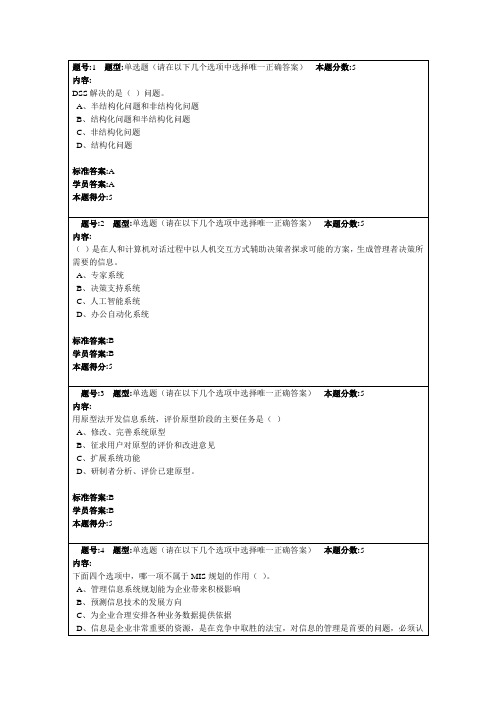
题号:1 题型:单选题(请在以下几个选项中选择唯一正确答案)本题分数:5内容:DSS解决的是()问题。
A、半结构化问题和非结构化问题B、结构化问题和半结构化问题C、非结构化问题D、结构化问题标准答案:A学员答案:A本题得分:5题号:2 题型:单选题(请在以下几个选项中选择唯一正确答案)本题分数:5内容:()是在人和计算机对话过程中以人机交互方式辅助决策者探求可能的方案,生成管理者决策所需要的信息。
A、专家系统B、决策支持系统C、人工智能系统D、办公自动化系统标准答案:B学员答案:B本题得分:5题号:3 题型:单选题(请在以下几个选项中选择唯一正确答案)本题分数:5内容:用原型法开发信息系统,评价原型阶段的主要任务是()A、修改、完善系统原型B、征求用户对原型的评价和改进意见C、扩展系统功能D、研制者分析、评价已建原型。
标准答案:B学员答案:B本题得分:5题号:4 题型:单选题(请在以下几个选项中选择唯一正确答案)本题分数:5内容:下面四个选项中,哪一项不属于MIS规划的作用()。
A、管理信息系统规划能为企业带来积极影响B、预测信息技术的发展方向C、为企业合理安排各种业务数据提供依据D、信息是企业非常重要的资源,是在竞争中取胜的法宝,对信息的管理是首要的问题,必须认真规划。
标准答案:A学员答案:B本题得分:0题号:5 题型:单选题(请在以下几个选项中选择唯一正确答案)本题分数:5内容:下面对现行系统详细调查的描述中,不正确的是()。
A、主要内容包括对现行系统的目标、主要功能、组织结构、业务流程、数据流程的调查和分析B、重点在于对现系统内部详细具体的了解C、目的是明确问题与系统开发要解决的主要问题和目标,论证系统开发的必要性和可能性D、主要任务在于理解现有业务问题和信息需求标准答案:C学员答案:B本题得分:0题号:6 题型:单选题(请在以下几个选项中选择唯一正确答案)本题分数:5内容:系统分析报告的主体中包括()。
2012春季目录大连理工大学出版社

76
3771-0 世纪商务英语——阅读教程(基础篇Ⅱ)(第四版)
77
2594-6 世纪商务英语——阅读教程(专业篇Ⅰ)(第四版)
78
2958-6 世纪商务英语——阅读教程(专业篇Ⅱ)(第四版)
79
2593-9 世纪商务英语——听说教程I(第四版)
80
2963-0 世纪商务英语——听说教程II(第四版)
73
2951-7 世纪商务英语——综合教程III(第三版)
74
3505-1 世纪商务英语——综合教程IV(第三版)
徐华琴
26.00
熊倪
28.00
马倩云
26.00
崔秀敏 陈梅 25.00
崔秀敏
26.00
崔秀敏
28.00
吴小琴
26.00
吴小琴
24.00
吴小琴
32.00
于风军
28.00
吴小琴
28.00
吴小琴
100 5722-0 实用阶梯英语--听说教程(商务篇2) 101 5097-9 实用阶梯英语--语法教程 102 5417-5 实用阶梯英语--英语国家概况 103 5254-6 实用阶梯英语--酒店英语项目实训指导书 104 5611-7 实用阶梯英语--跨文化交际 105 5836-4 实用阶梯英语--翻译教程 106 5959-0 实用阶梯英语--写作教程 107 6072-5 实用阶梯英语--英语专业毕业综合项目指导手册
81
2932-6 世纪商务英语——听说教程III(第四版)
82
3506-8 世纪商务英语——听说教程IV(第四版)
83
2580-9 世纪商务英语——口语教程基础篇I(第三版)
84
春季高考历年真题-2012年天津市春季高考英语试卷
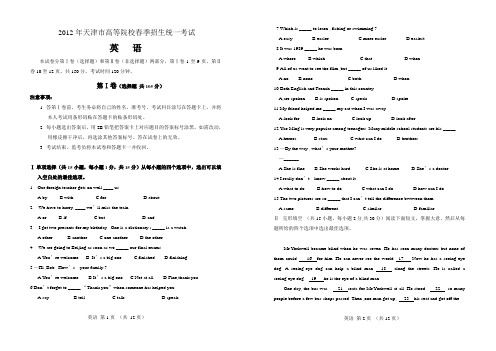
2012年天津市高等院校春季招生统一考试英语本试卷分第Ⅰ卷(选择题)和第Ⅱ卷(非选择题)两部分,第Ⅰ卷1至9页,第Ⅱ卷10至12页。
共150分。
考试时间120分钟。
第Ⅰ卷(选择题共105分)注意事项:1. 答第Ⅰ卷前,考生务必将自己的姓名、准考号、考试科目涂写在答题卡上,并将本人考试用条形码贴在答题卡的贴条形码处。
2. 每小题选出答案后,用2B铅笔把答案卡上对应题目的答案标号涂黑。
如需改动,用橡皮擦干净后,再选涂其他答案标号。
答在试卷上的无效。
3. 考试结束,监考员将本试卷和答题卡一并收回。
Ⅰ.单项选择(共15小题,每小题1分,共15分)从每小题的四个选项中,选出可以填入空白处的最佳选项。
1.Our foreign teacher gets on well ____ us.A.byB.withC.forD.about2. We have to hurry, ____ we’ll miss the train .A.orB.ifC.butD.and3. I got two presents for my birthday . One is a dictionary ; _____ is a watch.A.otherB.anotherC.one anotherD.the other4. We are going to Beijing as soon as we _____ our final exams .A.You’re welcomeB. It’s a big one C,finished D.finishing5.—Hi ,Bob . How’s your family ?A.You’re welcomeB.It’s a big oneC.Not at allD.Fine,thank you6.Don’t forget to _____ “Thank you”when someone has helped you.A.sayB.tellC.talkD.speak英语第1页(共12页)7.Which is _____ to learn , fishing or swimming ?A.easyB.easierC.more easierD.easiest8.It was 1989 _____ he was born .A.whereB.whichC.thatD.when9.All of us went to see the film ,but _____ of us liked it .A.noB.noneC.bothD.when10.Both English and French _____ in this country .A,are spoken B.is spoken C.speak D.spoke11.My friend helped me _____ my cat when I was away .A.look forB.look onC.look upD.look after12.Yao Ming is very popular among teenagers. Many middle school students are his _____.A.heroesB.starsC.what can I doD.brothers13.—By the way , what’s your mother?—______.A.She is fineB.She works hardC.She is at homeD.She’s a doctor14.I really don’t know _____ about it .A.what to doB.how to doC.what can I doD.how can I do15.The two pictures are so _____ that I can’t tell the difference bwtween them.A.sameB.differentC.similarD.familiarⅡ. 完形填空(共15小题,每小题2分,共30分)阅读下面短文,掌握大意,然后从每题所给的四个选项中选出最佳选项。
- 1、下载文档前请自行甄别文档内容的完整性,平台不提供额外的编辑、内容补充、找答案等附加服务。
- 2、"仅部分预览"的文档,不可在线预览部分如存在完整性等问题,可反馈申请退款(可完整预览的文档不适用该条件!)。
- 3、如文档侵犯您的权益,请联系客服反馈,我们会尽快为您处理(人工客服工作时间:9:00-18:30)。
2012年春季(2011
2012年春季(2011-2012第二学期)小学少先队工作总结
小学少先队工作总结
在市区委和学校领导正确引领下,我校少先队工作以实施雏鹰争章活动为基本导向,以“新世纪,我能行”实践体验教育活动为突破点,全面推进素质教育的实施。
以培养新世纪”四有”新人为目标,积极贯彻市少工委工作的指导思想,同时结合本校和队员实际,运用科学理论,探索少先队活动社会化的运作机制,充分发挥我校少先队组织的作用和教育功能。
本学年,我校少先队工作在学校行政的指导下、全体辅导员老师和少先队员的共同努力下,搞得有声有色,取得可喜成绩。
具体工作如下:
一、活动面向全体学生,抓住教育重点,重视学生全方位的发展。
每学年开学前,我校大队部都会拟订工作计划,针对我校同学的行为习惯发展和思维成长的变化,我校大队部有针对性的面向全体孩子开展有教育意义的活动,并且指向明确,目的在于,通过全校性的活动,来促使学生良好健康的发展,养成好的行为习惯。
我们从以下几方面入手:
1、注重常规教育,抓学生“自律”。
自新的《小学生守则》、
《中小学生日常行为规范》出台后,大队部在全校范围内掀起了学守则活动,要求每位队员熟读成颂,并体现在日常行为中。
同时,不断强化思想教育,每个年级分层次、分年级提出学习”七讲一爱”即讲文明、讲礼貌、讲卫生、讲守时、讲信用、讲秩序、讲道德和爱公物。
大力加强学生的行为习惯养成。
最后,通过活动的不断深入、进行,促使孩子在过程中达到自律的效果,受到同学、老师、家长的一致支持。
2、从安全教育入手,提高学生安全保护意识,加强同学们的责任感。
在全校范围了开展了“安全在身边”的综合实践活动课程,各年级围绕交通安全、消防安全、人身安全、网络安全等不同主题开展活动。
从不同层面、不同角度提醒同学们加强安全意识,学会自我保护及学会在生活中去保护他人。
3、建筑充满爱的生活,营造爱的氛围,让孩子爱家、爱师、爱父母、爱朋友。
我校由于小班化教育,多数孩子比较自我,在“爱心”方面表现出来的意识不明显,针对这个问题,我校大队部提出了“我付出,我建设,我爱我家”的大型综合实践活动,持续时间达两月之久。
在此期间,我校各个班级积极地响应,投入到活动中,创造性的开展,涌现出了许多“爱心小天使”,并且评选出了最优秀的三个“爱心示范班级”,同学们的“爱心集”上充溢着对亲人、伙伴、老师的浓浓爱语、生生之间、师生之间无形中驾起了一座爱之桥,在活动进行中,
我们无时无刻不感受到孩子们纯洁、善良、热忱的心,活动收效很大。
也为我校少先队工作的开展奠定了一个良好的基矗。
二、结合我校综合实践活动课程,开发、创新少先队活动开展形式。
对于少先队工作开展过程中的创新问题一直是我们不断研究、思考的重点。
在多年的探究中,我们终于能为其融入新鲜血液——那就是与综合实践活动课程相结合,缔造出多元化、多层次、多渠道的活动骨架,为少先队工作的进行开拓了一片新天地。
多元化:是指活动不再只是单纯的由中队辅导员、学生这样单一的群体进行。
新的模式融入了更为有力的群体——各个学科的知识领域和教授人员(教师),我们在活动中可以从他们那里寻求更多的帮助、更加有效率的结果。
比如我们的“安全在身边”综合实践活动中,微机老师利用网络手段为孩子们讲授消防知识、音乐课上老师教孩子们学唱《安全歌》、美术课、体育课上活动安全时刻紧记。
这些都把以往单调的少先队工作更广泛化,拓宽了活动领域,使其呈现多元化。
多层次:是指活动从纵向来看,显得更加进行科学化、正规化,活动在不同时间、不同发展阶段呈现不一样的效果,达到不一样的目标。
比如:在“我付出,我建设,我爱我家”活动中,我们将其定为四个阶段。
第一阶段是活动的筹备,各
班根据自己的具体情况构思、拟订活动计划。
第二阶段是活动的初步实施,将构想付诸于现实,且体现出活动主题;第三个阶段是活动的深入、能够创造性的开展,比如四年级一班在活动中,他们既有常规性的一些活动,如:爱心册、爱心作文集等,同时他们在第三阶段中还能创造性地将家长对孩子们的评价运用到活动中来,打开了活动领域,同时也取得了不错的效果,这些都是我们值得学习的经验。
第四阶段就是成果的展示阶段,很多班级,都能在最后阶段办出出彩的展示,把活动推向了高潮。
当然,我们最重要的还是看过程,展示固然重要,但没有过程的积累又怎会呈现丰富的内容呢因此,我们可以得出这样的结论,做好每一层面的工作,才会收到丰实的硕果。
多渠道:是指活动途径多样化,能最好的利用可利用的环境和手段,促使活动开展进程顺利。
为了能做到这点,并且更好的为教育服务,大队部大力挖掘社区、周边共建单位、校外辅导员等社会资源,大力为我校德育工作、少先队活动服务。
在下期开学初,我们请到市府武警连的叔叔们为同学们举行了一次别开生面的升旗仪式,这又是一次成功的爱国主义教育。
请来消防中队的同志,指导我校师生进行消防训练。
拓宽活动渠道,的确为我们的活动增添了不少活力,我们将继续以这样的形式进行我们的活动。
三、“体验丰富生活,感受大千世界”,继续深入开展少先队
体验活动,开拓实践新基地。
充满时代气息的活动,是少先队的灵魂所在。
随着时代的进步,少年儿童的时代特征和教育环境发生了重大而深刻的变化。
作为新世纪的少先队,必须顺应时代进步的潮流,站在时代的前列和实践前沿,解放思想,与时俱进,以创新开拓的思想观念和奋发有为的精神状态开展工作。
”新世纪我能行”体验教育活动,倡导”在实践中体验,在体验中感悟,在感悟中自我发展”的思想,是培养当代少年儿童实践能力和创新精神的活动。
体验活动作为我校特色性工作,的确让我们在以前尝到不少甜头。
今年,我们将雏鹰争章与体验活动相结合,在活动中开展校级、班级、个人争星活动,营造浓烈的教育氛围,充分调动各种教育因素,激发学生的主体内驱力,引导学生主动成长。
在“我爱我家”活动中我们设立了孝敬章、环保章、爱心章等。
通过外出体验活动,激励同学们积极踊跃地参加到实践活动中去,在安全教育活动中,我们带领部分孩子参观了消防基地,与消防战士们一起参加消防演习,不仅使孩子们学到了消防知识还大大激发了他们学习的兴趣,在体验中成长,在体验中感悟。
以德树人,加强少年儿童的思想道德教育。
活动的开展,有效地促进了我校少先队员素质的全面发展,潜移默化地培养了队员的道德品质、实践能力和创新精神。
少先队取得的成绩与我们各位老师的积极配合、努力工作是分不开的。
在
此我代表学校大队部对辛勤工作一年的老师们说声“辛苦了”!同时,也希望在下一学年里,老师们能一如既往的支持少先队工作,并及时为我们的工作提出宝贵的建议。
2012年, 春季, 少先队。
